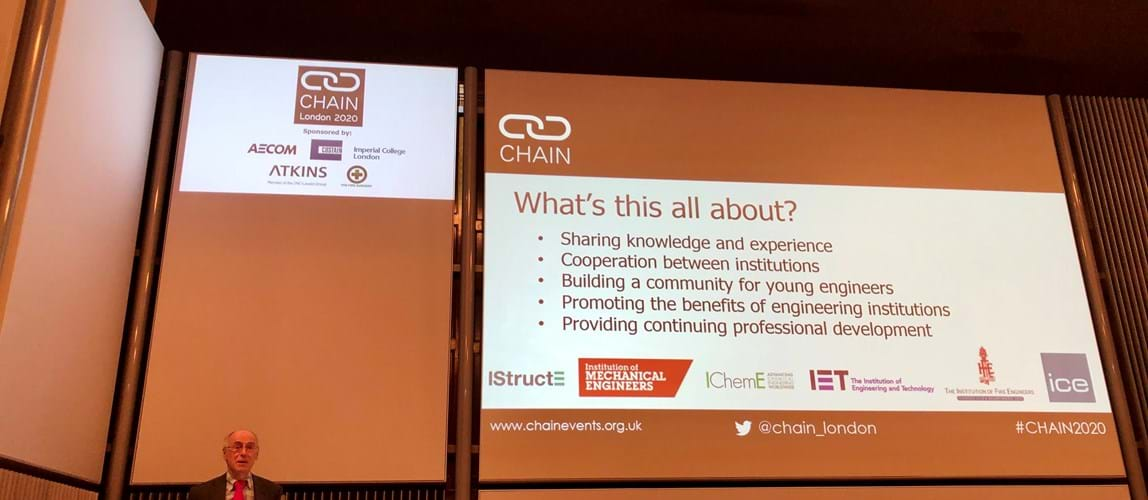London and South East Coast Young (UK)
CHAIN London

6th March 2020
CHAIN London 2020 is a joint initiative between the Young Member representatives of six professional engineering organisations, including the IChemE Young Members Forum of London and South East Coast (YMF L&SEC). This year the event was held at the Institute of Mechanical Engineers on Friday 28 February.
Dr Colin Brown, Director of the Institute of Mechanical Engineers, delivered the opening address and acted as the Event Chair and moderator during the panel discussions. The one-day event consisted of six talks, a workshop on collaboration behaviours, a panel discussion and a networking session. The theme of the event was ‘Engineering the New Decade’, with a detailed look at how innovations across multiple engineering disciplines could help solve some of the key challenges facing society in the 2020’s and beyond.
The first presentation titled ‘The Future of Heritage Fire Safety’, given by Andy Nicholson from the Institute of Fire Engineers, gave an overview of the fire safety strategies he has helped developed and implemented in some of the most high profile buildings in the UK, including; the Cutty Sark restoration and the O2 Arena.
The following presentation, delivered by infrastructure professional Dr Sian Thomas, titled ‘Tideway: Building for 21st Century London’, began with a brief history of the original sewer network developed in London. She elaborated on the logistical challenges faced whilst developing the 25km long ‘super sewer’ of the Thames Tideway Tunnel project and its benefits for London.
The third presentation, ‘Addressing the Future Challenges of Cyber Security’, by chief scientist and Fellow for cybersecurity firm McAfee, Raj Samani, highlighted the ever-growing importance of cybersecurity as our society becomes increasingly dependent on technology. He provided examples of how he has assisted technology companies such as Tesla and BoxLock by finding flaws in their technology and privately providing them a notice period to fix these faults before resorting to public exposure, thus providing benefit to both company and consumer.
Following a short refreshment break, Learning and Development Specialists from WSP, Jane Grant and Emily Mahoney led an interactive ‘Collaboration Behaviours Workshop’, which gauged the value that the early-career engineers in attendance placed on behavioural competencies. The take-away message from this session was the growing value clients find in behavioural assessments when deciding which companies to work with.
The fourth presentation of the day ‘Engineering in Healthcare: Saving Lives Through Technology’, was given by Dr Helen Meese, a Trustee of the Institute of Mechanical Engineers. She started with a brief overview of the history of engineering in the medical and healthcare sector and examples of some of the major advancements made in this area such as the miniaturisation of the pacemaker and the increasing reliance on robotics to conduct surgery. Dr Meese’s presentation concluded with a look at a potential future scenario where a patient could be diagnosed and treated within the comfort of their own home by a robot, thus helping to reduce the healthcare system burden.
The next presentation titled ‘Decarbonisation, Innovation and Energy’, was given by Yasmin Ali, a chartered Chemical Engineer and ex-Chair of our Young Members Forum, currently working in the Department for Business, Energy and Industrial Strategy (BEIS) for the UK Government. The presentation focused on the UK’s major sources of carbon emissions by sector and measures to reduce these emissions. The presentation also highlighted the progress that the UK Government has made on its commitment to reduce its greenhouse gas emissions by at least 80% by 2050, relative to 1990 levels.
Dr Mike Cook, a Principal Structural Engineer at BuroHappold, gave the final presentation of the event titled ‘How the Climate Emergency changes everything in our Built Environment’. He focused on the importance of design and efficient use of space to help preserve the natural environment, and the negative ecological and societal consequences resulting from the knock-on effect of poor design.
A panel discussion rounded off the talks, with the topic of discussion ‘If London had to decarbonise fully by the end of the 2020s, what would we need to do?’, as voted for by the young engineers in attendance. The discussion developed into the experts explaining what their respective institutions have already done to decarbonise London and what further actions their institutions are taking to continue the decarbonisation.
The day concluded with a networking event attended by representatives from a range of engineering institutions, providing a chance for young engineers to learn more about the wider industry and expand their professional networks for collaboration and improved career opportunities.
Back to group news